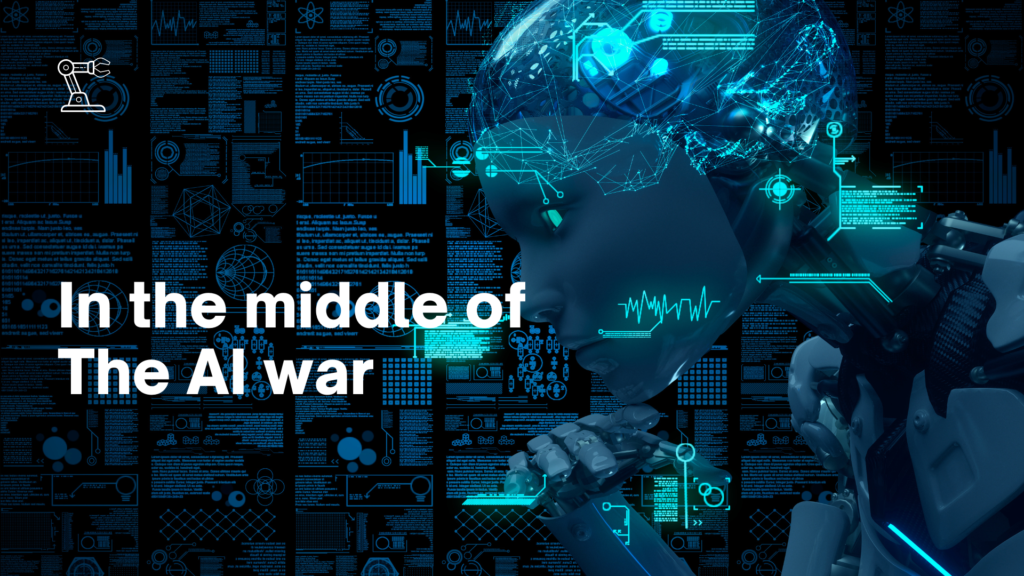In the Middle of the AI War: The Strategies and Future of Google, OpenAI, Perplexity & More
March 22, 2025 | by cutepm.com


If there’s one keyword that defines the tech world today, it’s without a doubt the AI war. This isn’t just a battle over who can build the smartest chatbot – it’s a full-scale race to create the next major computing platform that could reshape how we live, work, and interact with technology.
AI is no longer just “a smart assistant that talks back.” It’s becoming a digital helper that can take actions for us, make decisions, and eventually become a personal agent — a kind of virtual version of ourselves.
In this war, major players like Google, OpenAI (creator of ChatGPT), Perplexity, Anthropic, Meta, and Mistral are all competing with different visions, technologies, and strategies. Each one is racing to shape the future of AI — and to win your trust.
The Era of AI Agents Has Just Begun
In the past, we used to ask AI things like, “What’s a good cafe nearby?” and it would give us answers. But that’s changing fast.
Now, imagine saying:
“Book me a cafe nearby tomorrow at 2pm — only if it’s not raining — and text my friend the address.”
This isn’t just search. It’s action. It’s an agent working on your behalf.
We’re now entering a new phase of AI: the Agent Era, where AI not only understands, but executes — just like a human assistant would.
So What Are These Companies Really Doing?
OpenAI (ChatGPT) – Becoming Your Personal AI
OpenAI isn’t just trying to build a smarter chatbot. It’s trying to make ChatGPT the central tool for your entire life – from writing, coding, learning, to scheduling.
With features like memory, custom GPTs, and a GPT Store, ChatGPT is evolving into an intelligent assistant that knows you -your tone, your preferences, even your sense of humor.
In the near future, we’ll likely see a voice – enabled AI from OpenAI that can take actions, plan your calendar, help with daily life, and more. Think of it as a second brain that lives in your phone or laptop.
Google (Gemini) – Defending the Search Empire
Google has always been the world’s gateway to information. But now that people are turning to AI for answers, Google is under real pressure to evolve.
Their response? Gemini — an advanced AI model that’s being woven into every Google product: Gmail, Docs, Android, Chrome, and especially Search.
Google’s strategy is to make sure you don’t need to leave their ecosystem. In the future, we may even see an AI-first Android OS, where the assistant is built into every interaction you have on your phone.
Perplexity – The Search Disruptor
Perplexity is building an AI-native search engine that’s fast, trustworthy, and fully sourced. It’s not just giving you links — it’s giving you straight answers with citations, instantly.
As people get tired of ads and irrelevant results, Perplexity is becoming the go-to for developers, researchers, and students who want clean, accurate, real-time information.
Its long-term play? Possibly replacing Google itself — with a modern, transparent, ethical search experience.
Anthropic (Claude), Meta (LLaMA), Mistral – The Open AI Movement
While companies like Google and OpenAI focus on closed, powerful models, others like Anthropic, Meta, and Mistral are pushing for open-source, accessible AI.
Anthropic’s Claude is especially focused on safety, alignment, and trustworthiness — perfect for use in enterprises, education, or government. Mistral and Meta, on the other hand, want to keep powerful AI free and customizable by developers everywhere.
In the open AI world, the mission is clear: AI shouldn’t be locked behind a paywall. It should be a public good.
Key Trends Shaping the Future
1. Search is Being Reinvented
The old “10 blue links” format is dying. AI is starting to answer and act for you — skipping the middle step entirely.
2. Agents Will Do the Clicking for You
Shopping, scheduling, replying to emails, summarizing meetings — all will soon be handled by AI agents, not by you manually clicking around.
3. Personalization is Everything
AI will remember your tone, habits, preferences, and goals — and act accordingly. It won’t just be “smart.” It’ll feel like it knows you.
4. Monetization Will Happen Through Ecosystems
Rather than charging for the AI itself, companies will make money by embedding AI into search, apps, operating systems, and enterprise tools. The AI becomes the gateway — and the value is in the ecosystem around it.
So… Who’s Going to Win?
At the end of the day, the winner of the AI war won’t just be the one with the most advanced tech. It’ll be the one who earns your trust.
Because as AI gets more powerful and more integrated into our lives, we’ll need to trust it with more decisions, more data — and more responsibility.
We’re entering a world where we won’t just search — we’ll consult. We won’t just click — we’ll command. And we won’t just browse — we’ll delegate.
RELATED POSTS
View all

